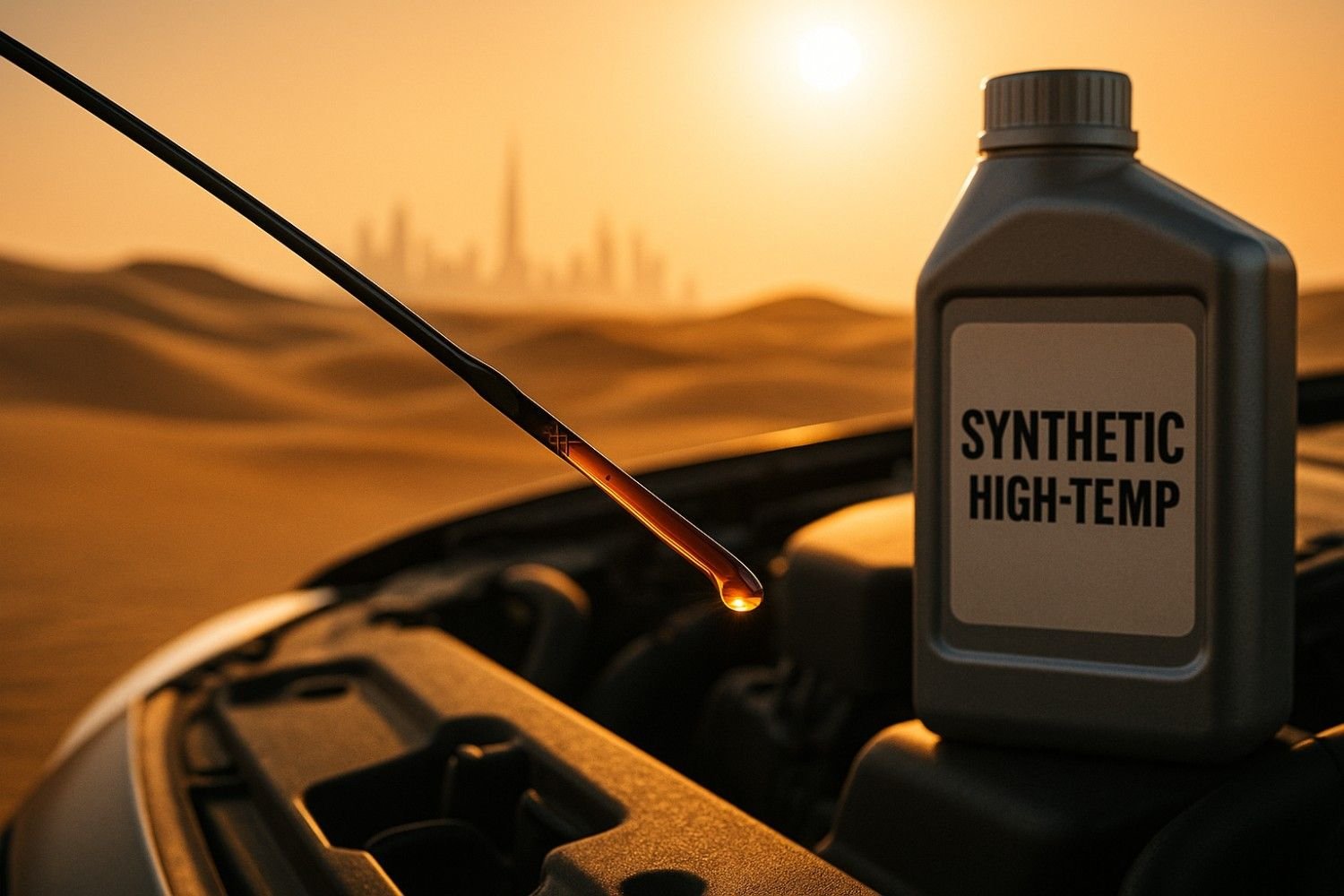08. 20. 2025
How Often Should You Change Your Oil in Dubai’s Climate?

Car ownership in Dubai comes with unique challenges. Between the scorching heat, dusty desert winds, and heavy city traffic, your vehicle faces much tougher conditions compared to cars in milder climates. One of the most important aspects of keeping your car healthy here is regular oil changes.
But how often should you really change your oil in Dubai’s climate? Is it every 5,000 kilometers, every 10,000, or something else entirely? The answer isn’t one-size-fits-all it depends on the oil you use, how you drive, and the specific needs of your car. In this guide, we’ll explore how Dubai’s environment affects your engine, the signs your car needs fresh oil, and the best practices to make sure your vehicle runs smoothly for years to come.
Why Oil Changes Are So Important in Dubai
Engine oil is often called the lifeblood of your car, and for good reason. It lubricates moving parts inside the engine, reduces friction, and prevents overheating. Oil also carries away dirt, debris, and combustion byproducts that can damage internal components.
In a city like Dubai, oil plays an even greater role. With temperatures soaring past 45°C in summer, your engine is under constant stress. Oil that might last 10,000 kilometers in a cooler climate can degrade much faster here. Add in dusty roads, sandstorms, and stop-and-go traffic, and you’ve got conditions that shorten oil life significantly.
If you delay oil changes, your engine can suffer from increased wear, overheating, reduced performance, and even catastrophic failure. That’s why paying attention to oil change frequency in Dubai is not just good practice — it’s essential for keeping your car roadworthy.
Factors That Affect Oil Change Frequency in Dubai
When it comes to oil changes, there’s no single rule that applies to every vehicle. Instead, several factors determine how often you should replace your oil.
The Impact of Extreme Heat
Dubai’s desert climate is unforgiving. High temperatures accelerate the breakdown of oil molecules, reducing its ability to lubricate effectively. Even high-quality oils can thin out in extreme heat, which means they provide less protection against metal-to-metal contact inside your engine.
Sand and Dust in the Air
The desert environment brings fine sand and dust particles that can infiltrate your engine. While your oil filter captures most contaminants, some still circulate through the system. Over time, this makes oil gritty and less effective, forcing you to change it sooner.
Driving Conditions in Dubai
Driving habits and conditions also play a huge role. Many Dubai residents spend hours in traffic jams, where engines idle for long periods. Stop-and-go traffic creates extra heat and stress on the engine compared to steady highway driving. On the other hand, long highway trips at high speeds also demand more from the oil. Both scenarios shorten the recommended interval between changes.
The Type of Oil You Use
Not all oils are created equal. Conventional mineral oils break down faster under heat, while synthetic oils are engineered to withstand higher temperatures and last longer. Semi-synthetic blends fall somewhere in between. If you’re using conventional oil, expect to change it far more often in Dubai compared to a fully synthetic option.
Vehicle Age and Manufacturer Guidelines
Lastly, your car’s age and manufacturer guidelines matter. Older vehicles with worn engines usually require more frequent oil changes. Modern cars often come with advanced engines designed to work with synthetic oils for longer intervals. Always consult your car manual, but keep in mind that “normal” recommendations are often meant for moderate climates, not extreme ones like Dubai.
Recommended Oil Change Intervals in Dubai
So what’s the magic number for Dubai drivers? While recommendations vary, here’s a practical breakdown:
- Conventional oil: Change every 3,000 to 5,000 kilometers.
- Semi-synthetic oil: Change every 5,000 to 7,000 kilometers.
- Fully synthetic oil: Change every 7,500 to 10,000 kilometers.
| Type of Oil | Normal Interval | Adjusted for Dubai Climate | Best For |
|---|---|---|---|
| Conventional Oil | 5,000 – 7,000 km | 3,000 – 5,000 km | Older cars, budget-friendly servicing |
| Semi-Synthetic Oil | 7,000 – 8,000 km | 5,000 – 7,000 km | Balanced performance & cost |
| Fully Synthetic Oil | 10,000 – 12,000 km | 7,500 – 10,000 km | Modern engines, high performance, extreme heat |
In Dubai, however, it’s best to stay on the safer side of these ranges. For example, even if synthetic oil claims to last 10,000 kilometers, aim for an oil change around 7,500 kilometers due to the extreme heat and dusty conditions.
Common Oil Grades for Dubai and Their Benefits
| Oil Grade | Best Feature | Why It Works in Dubai |
|---|---|---|
| 5W-30 | Balanced protection, good for most cars | Handles cold starts + high heat |
| 10W-40 | Strong high-temperature resistance | Perfect for desert driving & older engines |
| 0W-40 | Premium performance, wide temperature range | Great for luxury & performance vehicles |
| 20W-50 | Thick oil, protects against wear in hot engines | Suitable for older, high-mileage cars |
To make things clearer, think of it this way: If you mostly drive short city trips with lots of traffic, change your oil more often. If you spend more time on long highway journeys, you might stretch the interval slightly longer but don’t ignore the effect of the climate.
Signs Your Car Needs an Oil Change Sooner
Even if you follow mileage guidelines, there are times when your car might need an oil change sooner than expected. Here are a few signs to watch out for:
- Dirty or dark oil: Fresh oil is amber in color, but if it looks thick, dark, or gritty on the dipstick, it’s time for a change.
- Engine noise or knocking: Lack of lubrication can cause unusual sounds from under the hood.
- Dashboard warning lights: If the oil change or check engine light appears, don’t delay.
- Burning smell inside the car: Overheated or contaminated oil can create a noticeable odor.
- Reduced fuel efficiency: A sudden drop in mileage often means your engine isn’t running as smoothly as it should.
Catching these signs early can save you from expensive repairs down the line.
Best Oils for Dubai’s Climate
Choosing the right oil is just as important as changing it on time. In a hot environment like Dubai, synthetic oils are usually the best choice. They resist heat breakdown, maintain viscosity, and protect your engine longer.
Look for oils with viscosity grades like 5W-30 or 10W-40, which balance cold-start performance with high-temperature stability. Trusted brands such as Mobil 1, Castrol, Shell, and Total offer synthetic options specifically designed for high-performance engines and extreme climates.
When in doubt, follow the manufacturer’s recommendation for viscosity and certification (like API SN or ACEA A3/B4). Using the wrong oil grade can cause more harm than good, so always double-check before topping up.
Where to Get an Oil Change in Dubai
Now that you know how often to change your oil, the next step is deciding where to get it done. Dubai offers several options, each with its pros and cons.
Authorized Dealerships
These are usually the safest choice for new cars still under warranty. Dealerships use genuine parts and follow manufacturer schedules, but their services often come at a premium price.
Independent Garages
A trusted local garage can provide the same quality service at a lower cost. Many are RTA-approved and stock well-known oil brands. Just make sure the workshop has a good reputation and uses genuine filters.
Mobile Oil Change Services
Dubai also has mobile mechanics who come to your location — whether at home, office, or roadside. This option is convenient and often cost-effective, though quality can vary depending on the provider.
In terms of cost, expect to pay anywhere from AED 150 to AED 400 for an oil change in Dubai, depending on the type of oil, car model, and service location.
Tips to Extend Oil Life and Protect Your Engine
While oil changes are unavoidable, there are simple steps you can take to maximize oil life and keep your engine in top shape.
- Use high-quality synthetic oil that can withstand Dubai’s heat.
- Check your oil level regularly — once every couple of weeks is a good habit.
- Replace the oil filter with every oil change to prevent contaminants from circulating.
- Stick to your service schedule and don’t delay maintenance.
- Keep your engine clean by washing your car regularly to reduce dust buildup around seals.
These small practices can save you money in the long run by reducing wear and tear on your engine.
Final Thoughts
Dubai’s climate demands more attention to car maintenance than most places in the world. With extreme heat, dusty conditions, and heavy traffic, oil doesn’t last as long as it might elsewhere. As a rule of thumb, aim for an oil change every 5,000 to 7,500 kilometers using high-quality synthetic oil. Watch out for early warning signs, follow your car manufacturer’s recommendations, and choose a trusted service provider.
FAQ’S
1. Is it okay to change oil every 5000 km?
Yes, changing oil every 5,000 km is a safe interval, especially in Dubai’s hot and dusty climate. Heat and sand shorten oil life, so even if your manufacturer allows longer, 5,000 km changes provide better protection, smoother performance, and longer engine life.
2. How much oil change in Dubai?
The cost of an oil change in Dubai usually ranges between AED 150 and AED 400. The price depends on the type of oil (conventional, semi-synthetic, or synthetic), the car model, and whether you choose a dealership, independent garage, or mobile service.
3. How frequently should oil changes be done?
In Dubai, most cars need oil changes every 5,000 to 7,500 km. Conventional oils should be replaced sooner, while synthetic oils last longer. However, extreme heat, heavy traffic, and dusty roads mean shorter intervals are safer to prevent engine damage and maintain fuel efficiency.
4. Is it okay to change oil every 10,000 km?
In cooler climates, some synthetic oils last up to 10,000 km. But in Dubai, it’s not ideal due to high heat and dusty air, which shorten oil life. To protect your engine, it’s safer to change synthetic oil around 7,500 km instead of waiting for 10,000 km.
5. How to know if it’s time to change oil?
You may need an oil change if the oil looks dark and gritty, the engine makes unusual noises, or your dashboard warning light appears. Other signs include burning smells, reduced fuel efficiency, or sluggish performance. In Dubai, check oil regularly since harsh conditions accelerate oil breakdown.
6. What are the symptoms of dirty engine oil?
Dirty engine oil can cause dark smoke, rough idling, reduced mileage, and louder engine noise. The oil itself looks thick and black on the dipstick. In Dubai’s climate, dust and heat make oil dirty faster, so these symptoms often appear earlier than in cooler regions.
7. What happens if you don’t change your oil?
If you don’t change oil on time, it thickens into sludge, loses lubrication, and causes engine wear. Overheating, poor fuel economy, and potential engine failure can follow. In Dubai, delaying oil changes is riskier since extreme temperatures break down oil much faster than normal.
Social Share:

No Comment Yet! You can post first response comment.